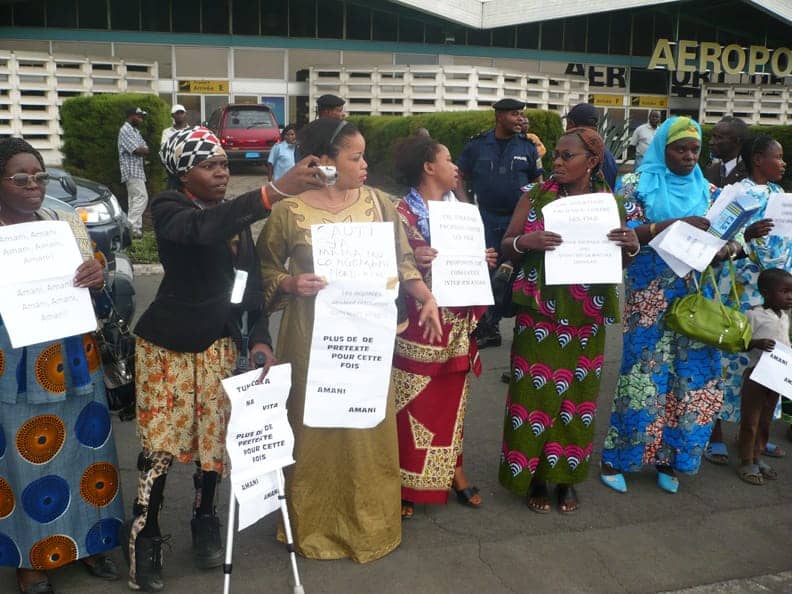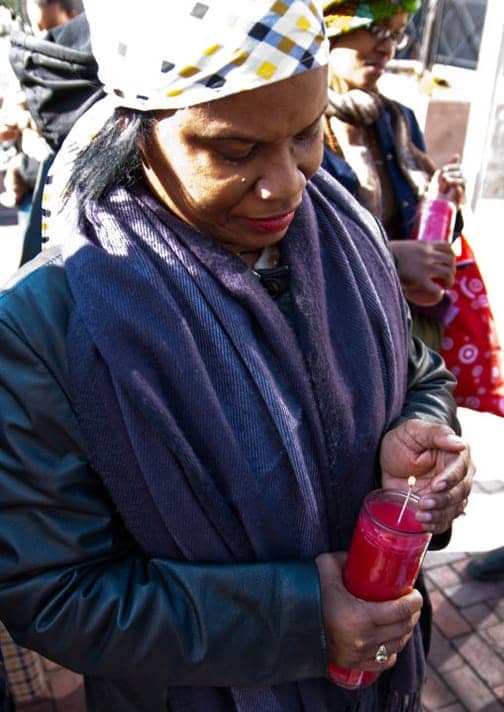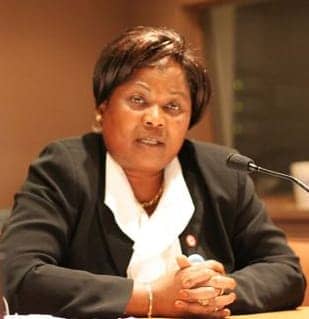 Meet Kambale Musavuli on Sunday, April 18, 6:30 p.m., at the Black Dot Cafe, 1195 Pine St., West Oakland, and learn how you too can break the silence on the resource war in the Congo that has claimed 6 million lives for the minerals essential to our cell phones, laptops and military weapons
Meet Kambale Musavuli on Sunday, April 18, 6:30 p.m., at the Black Dot Cafe, 1195 Pine St., West Oakland, and learn how you too can break the silence on the resource war in the Congo that has claimed 6 million lives for the minerals essential to our cell phones, laptops and military weapons
by Bibiane Aningina Tshefu and Kambale Musavuli, Friends of the Congo
Several women from the Democratic Republic of Congo came to New York last month to participate at the United Nations’ 54th Commission on the Status of Women. This is a high level annual international Women’s Forum. The Congolese women represented both government and non-government sectors as well as different provinces of their country. They had ample opportunity to raise their concerns to the gathering during assembly and to speak to United Nations officials and policy-makers, members of the New York civil society and community, as well as key members of President Obama’s administration.
The women came with a singular focus, to articulate how Congolese women felt the global community could best address the 14-year conflict in the D.R. Congo. Wherever the women ventured, whether it was a community forum in Harlem, gatherings at local churches, forums at the United Nations or meetings with Obama administration officials, they articulated a consistent and resolute message: Listen to the Congolese for a change, as “we have repeatedly shared with the international community how they can optimally participate in bringing an end to the geo-strategic resource war in the Congo.”

The Congolese women shared the following prescriptions to bring an end to the conflict:
1. Inter-Rwandan dialogue between Rwanda’s Tutsi leadership and Hutu rebels inside Congo. There are no military solutions to what is essentially a political crisis.
2. Opening and expansion of democratic space inside both Rwanda and Uganda so their internal conflicts will cease being fought on the bodies of Congolese women.
3. Greater participation in political life and the decision-making process on the part of Congolese women.
4. Redirection of focus on the part of the global community from targeting the symptoms or effects of the conflict to addressing the root causes – primarily a foreign resource war being waged inside Congo to the detriment of innocent civilians.
There are no military solutions to what is essentially a political crisis. Conflicts must cease being fought on the bodies of Congolese women.

Go online to read the messages from the women:
Sen. Eve Bazaiba Masudi, “The Political Implication of Congolese Women, for Change and the Promotion of Good Governance in the DRC,” friendsofthecongo.org/pdf/bazaiba.pdf
Mme Annie Matundu Mbambi, “The Role and Involvement of Women in the Congolese Peace Process,” friendsofthecongo.org/pdf/matundu.pdf and reprinted below
Mme Jeanine Gabrielle Ngungu, “The Problematic of Violence Against Women: A Major Challenge in the National Reconstruction Process,” friendsofthecongo.org/pdf/ngungu.pdf
Mme Marie-Claire Faray, “A Message from Congolese Women on the 8th March International Women’s Day,” friendsofthecongo.org/2010/03/message-from-congolese-women-on-8th.php and in the Bay View under the headline, “Only Congolese will initiate and bring change to DR Congo”
Women’s International League for Peace and Freedom (WILPF) message from Congolese women, a video message read by Katherin Machalek, WILPF consultant, webcast.un.org/ramgen/ondemand/conferences/unhrc/thirteenth/hrc100324am2-eng.rm?start=01:03:02&end=01:05:12
Remember to join Friends of Congo on the Break the Silence Tour. Go here to see the tour stops: friendsofthecongo.org/upcomingevents. And don’t miss Kambale Musavuli on Sunday, April 18, 6:30 p.m., at the Black Dot Cafe, 1195 Pine St., West Oakland.
Bibiane Aningina Tshefu is women’s coordinator and adviser for Friends of the Congo and Kambale Musavuli is student coordinator and spokesperson for Friends of the Congo. Contact them through Kambale@friendsofthecongo.org and, to learn more, visit www.friendsofthecongo.org.
The role and involvement of women in the Congolese peace process
Statement by Annie Matundu-Mbambi, Women’s International League for Peace and Freedom, DRC Group, read by Bibiane Tshefu, Friends of the Congo
Distinguished guests, dear participants and panelists,

Armed conflicts have devastated the Great Lakes Region of Africa since October 1991 and produced harmful consequences on all the plans. In the Democratic Republic of Congo (DRC), we have had 14 years of bloody war and huge loss in human life. This war has fundamentally distressed existing infrastructure, disturbed social cohesion within the communities, changed policies touching economic and social conditions of the country, caused the exodus of populations and terrible trauma from frequent armed violence due to the illicit proliferation of small arms and light weapons, as well as looting of the country’s natural resources.
It is recognized that men and women experience conflict differently. While men are often involved in the fighting on a voluntary basis or following a compulsory recruitment, women are most often left to bear the entire burden of ensuring the survival of their families despite the violence, especially sexual gender based violence. Sometimes women find themselves as sex slaves, cooks or carrying the burdens of war.
According to a 2008 U.N. report on mortality, it is estimated that 67 percent of the dead were women and children. At the moment, the situation in eastern DRC is still worrying and cannot leave the conscience of Congolese women indifferent. Armed conflicts continue to destabilize efforts to improve infrastructure and keep economic and social structures in place.
The core of the family unit has been dismantled and new roles and values have appeared; therefore women have had to adapt in order to survive. Faced with situations of extreme hardship as a result of war, women were brought to take on new responsibilities. Many women have chosen to continue to play a role in maintaining daily survival and to engage in conflict prevention and in the process of peace building at local, national, regional and international levels.
However, it is important to indicate that the involvement of Congolese women in the resolutions of conflicts of recent years stem from a long painful process because there were many sacrifices, including intimidation, death threats, killings, torture, humiliation, extortion and exclusion. Although not being signatory to any of the peace agreements, Congolese women were involved early in the multifaceted mobilization for a meaningful participation in the peace process in the DRC.
Despite the commitment of civil society and the willingness of Congolese women to wrest 30 percent of representation in the pre-dialogue, dialogue and other conferences on peace negotiations, as well as the commitment of the Congolese state to implement the recommendations of the Platform for Action of Beijing 1995 and the ratification of the Convention on the Elimination of All Forms of Discrimination against Women (CEDAW) and adoption of U.N. Security Council Resolution 1325, it is regrettable to note that the representation of women at the negotiating table remains insignificant. Thanks to the efforts undertaken with the assistance of the international community to resolve those conflicts from where emerged the political agreements of Pretoria and Sun City in 2002 aiming at the installation of a new political order, Congolese women have been very active in the restoration of peace in the DRC.
With the support of the international partners, the initiatives of Congolese women have grown. They have established structures and most dynamic organizations to disseminate their ideas and mobilize the masses. The fundamental objective of these women’ s movements was the immediate end of wars, violence and the beginning of the negotiation for the pacification of the country, the restoration of its unity, integrity and national sovereignty and the struggle for institutional and legal parity between men and women in the management of public affairs.
In political and community life, women took an active part in organizing themselves into associations, to NGOs for development and protection and the defense of human rights etc. Through their various peace marches, they have committed themselves to demand the cessation of hostilities and the beginning of political negotiations through certain cities of the country. These steps were accompanied by slogans, banners and clothing with inscriptions against the war. They were presented as those involving the lives and must protect them.

* 1999: Lusaka agreement for a cease-fire in the DRC;
* 2001: Republican Pact Gaborone;
* 2002: the political negotiations with call for the Inter Congolese Dialogue in Sun City, resulting in the Global and Inclusive Agreement;
* 2003: Endorsement of the Global and Inclusive Agreement by all the delegates of the Inter Congolese Dialogue, the constitution and the establishment of the transitional Constitution;
* 2004: The regional conference of women in Kigali for the effective implementation and end to outbreaks of tension in the Great Lakes countries; The Declaration of Dar-es-Salam adopted by Heads of State of the Great Lakes Region; The referendum of the Constitution of the Third Republic;
* 2006: The signing in Nairobi of the Pact on Security, Stability and Development; The good will mission with the first ladies of some Africans countries to tranquilize the conduct of presidential elections and the establishment of democratic institutions;
* 2008: Amani Agreement for Peace and Security in Eastern DRC.
Taking you as witness, I raise the cry and sorrow of Congolese women by saying that women should not be reduced to the simple status of victims in times of conflict. As collective voices of Congolese women, we are sounding the alarm on Objectives 5 of the Beijing Platform for Action, on Women and Armed Conflict in the DRC, and on UN CS REC 1325, 1820, 1888 and 1889, all on Women, Peace and Security, calling on their implementation in the DRC.
Congolese women ask for their voices to be considered and request that:
– The five permanent members of the United Nations Security Council demonstrate the political will to support human security, human development and democracy in the Great Lakes region of Africa, particularly in the DRC.
– The governments of the Great Lakes regions of Africa resolve conflicts through genuine dialogue involving women in accordance with UN SC Resolution 1325 and the solemn Declaration of Heads of African States.
– Women are recognized as actors and negotiators of peace and participate in all processes of prevention, management and peaceful resolution of conflicts and reconstruction of their countries;
We recommend that
– the special needs of women and girls in conflict zones be taken into account by the government and international agencies;
– the elaboration of the National Action Plan on the implementation of Resolution 1325 be achieved in consultation with parliament, government and civil society;
– Women’ s organizations be adequately institutionally supported during and after conflict to participate in the process of negotiations and intervention on peace building;
– International experience in exchange and sharing be carried out to weave the relations of solidarity between women of the countries in war or post conflict and those in the DRC;
– Post-conflict programs be designed and developed to promote gender equality in line with the Objective 3 of the Millennium Development Goals, which will lead to the development of DRC and reduce poverty.
Congolese women are committed and engaged in the spirit of UN SC Resolution 1325 as well as the objectives of the Millennium Development Goals to promote human rights and particularly those of women in all its dimensions – civil, political, economic, social and cultural – to ensure a better future for future generations.
Thank you for your attention.
Annie Matundu-Mbambi is president of the DR Congo group of the Women’s International League for Peace and Freedom. She can be reached at amatmbambi@yahoo.fr. This address was delivered March 10, 2010, at a special event organized by members of the WILPF for DRC during the 54th session of the U.N. Commission on the Status of Women 2010, “The political implication of Congolese women in change and in promoting good governance in the DRC.”






